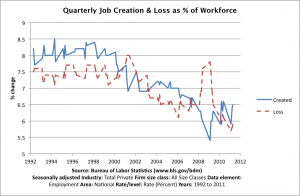To regulate Commerce with foreign Nations, and among the several States, and with the Indian tribes. US Constitution, Article 1, Section 8
This simple phrase (aka “the commerce clause”) has been a bone of contention almost since the day it was penned. Judicial interpretation was necessary as early as 1824. The conflict surrounding this clause speaks more to the general disagreement over the proper role of government rather than to an inability to properly interpret it. That is to say, no matter how one might restate this clause, each side would forever strain to interpret it to mean that which they wish it to mean. The key to understanding it is to not even try to interpret it, but rather to take the plain language at face value within the context of the document in which it is found. The US Constitution is a simple document with simple rules. To understand it, it is necessary to recall that the states were originally separate sovereign entities (that happened to owe allegiance to the British crown). Today we tend to think of states as nothing more than large postal codes, but that was not their original character, nor was that character changed by the Constitution (why join a union that requires you give up all your authority to the new central authority?) The citizens of those states believed they would be more secure by joining together (“the United STATES”) while still remaining sovereign within their respective borders. Whenever humans come together they need rules to define the relationship so everyone knows where they stand. That is all the Constitution does. It simply says: (Articles 1-3) there are three branches of government and here is what each can do (enumerated powers) and cannot do, (Article 4) here are the responsibilities of the states to each other and the responsibility of the government to the states, (Article 5-7) general housekeeping with respect to modifying and ratifying the document itself and matters relating to clarifying jurisdictional supremacy.
So, the commerce clause, taken in the context of being part of the rules that govern the relationships among the states, is simply saying that the federal government can do what is necessary (regulate) to prevent the states from interfering in commerce (trade). It simply supplants their prior authority with a single authority so that they would not be fighting amongst themselves in endless pissing matches over who has ultimate authority in relation to trade. To be clear, it is only the states and the federal government, not the citizens, which are governed by the Constitution. This makes sense if you think about it. The Constitution was written by the citizens (“We the People…”) in order to define the role and limits of the government they desired. Yes, the government may make laws that govern the citizens but only via the authority granted in the Constitution to make such laws. If there is no authority for a law in the Constitution then it is de facto “unConstitutional” no matter how “good” we might think it is. The problem occurs when the proponents of a law want to make it “Constitutional” by redefining and broadening terms used in the Constitution so as to facilitate an interpretation conducive to their desired goal.
One of the more egregious cases of twisted logic and Constitutional redefining came into play in the seminal case of Wickard v Filburn 317 U.S. 111 (1942). The Supreme Court found that Roscoe Filburn was engaged in interstate commerce and therefore fell under the jurisdiction of the Agricultural Adjustment Act of 1938, which granted the government authority to regulate agricultural output in order to maintain price “stability”. They found that he was growing “too much” wheat on his farm – even though the wheat was entirely consumed on his farm and was never sold – and thus he had no need to purchase additional wheat. The logic being that had he not grown “too much” he would have had to buy what he needed and such purchasing would have tended to increase the interstate demand and hence price for wheat. So, not buying something is, by government logic, equivalent to engaging in interstate commerce.
Based on this precedent one might conclude the current court has no choice but to rule in favor of the individual mandate of the PPACA as its supporters justify it upon putative commerce clause grounds, i.e. not buying insurance affects the price of insurance for everyone else. However, there is a subtle wrinkle here. Mr. Filburn was engaging in activity (growing wheat), which resulted in inactivity in another arena (buying wheat). In that case the government exerted its right to regulate his ACTIVITY of growing wheat, not his INACTIVITY of not buying wheat. The AAA said he could not grow more than such and such amount. It did not say he MUST buy wheat if he needs it or face a penalty. In the current case the government is asking the court to assert that the commerce clause goes even further than in Wickard v. Filburn and can grant the government authority to compel an individual to act (buy insurance). In other words, it now wants the authority to regulate inaction by redefining inaction as a type of action.
But whether the PPACA is overturned or not is not the important issue. The critical issue is the very nature of the Constitution. Article 1, Section 8 of the Constitution lists these things called “enumerated powers.” That means, it is a list of those actions, and only those actions, that Congress may undertake. If it is NOT on the list, they may not do it. It is improper to interpret the Constitution with a mindset of “Well if they didn’t want us to do that they would have specifically said so.” They did say so, if it is not enumerated it may not be done. But even disagreement over what the enumerated powers authorize is not so important. Reasonable people can disagree about the extent to which they think government should have certain authority. The important issue is that (hopefully) there will always be agreement that there must be some limits on government. The disagreements we have today are simply about where that point is, not whether or not it should exist.
If the Supreme Court finds that the commerce clause can be used to compel citizens to do or not do something because it might tangentially affect commerce, then there is in practice no limit whatsoever on the powers of Congress and it simply makes a mockery of the enumerated powers. It would make no sense for the framers of the Constitution to say “you can only do a, b, and c, and oh by the way you can also do anything else you can possibly think of.” Why would this remove all restraint from government powers? Think about it – whenever we are doing something we are also not doing a million other things. Government would now have the authority to identify the things we are not doing but that it thinks we should be doing and codify laws that compel us to do those things. How hard is it to imagine that in the midst of a new economic downturn Congress passes a Minimum Economic Activity Act which would require all citizens to spend a certain percentage of their income on goods and services in order to keep the economy going? Or how about a law requiring a minimum level of exercise, since not exercising makes us less healthy and that means rising health care costs. Congress would now have unlimited power to order us to do any number of things we aren’t doing. What’s to stop them? Inactivity is regulated by the commerce clause.
It is naïve to comfort oneself with the thought that just because today no one is abusing that power we have nothing to worry about.


